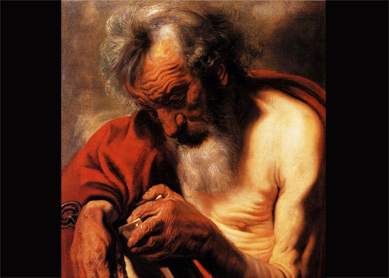1 Peter is one of two letters in the New Testament attributed to the apostle Peter (1Pet 1:1, 1Pet 5:1; see 2Pet 1:1, 2Pet 3:1). Scholars debate whether Peter actually wrote this letter, however. This is primarily because the language and style of 1 Peter represent a higher level of formal education in Greek and rhetoric than what we might expect of a Galilean fisherman. Given Peter’s status as an apostle, though, he could have commissioned a secretary to compose the letter—a common practice in the ancient world. Whether the letter was written by Peter in the early 60s C.E. (that is, before his death) or written in his name later in the first century, the problem it addressed remains the same: Followers of Jesus were being ostracized on account of their faith. How were they to respond?
The author wrote to Christ-followers on the Anatolian Peninsula (modern-day Turkey; 1Pet 1:1) whose commitments to Jesus Christ led to transformed attitudes and behaviors that placed them on the margins of respectable Roman society. They had become the victims of slander, animosity, and scorn. Previously, they had participated in mainstream Greco-Roman society, but at this point they were failing to participate in typical behavior (which the author characterizes as unrestrained wickedness and idolatry—see 1Pet 4:3-4), and they were disloyal to prevailing social values. These behaviors marked them as social misfits to be held in contempt. Accordingly, 1 Peter is concerned above all with issues of Christian identity and behavior in a non-Christian world.
Stated simply, 1 Peter gives its readers a strong sense of membership among God’s people: “You are a chosen race, a royal priesthood, a holy nation, God’s own people” (1Pet 2:9). For 1 Peter, God’s people think and act differently because they are different. “Like obedient children, do not be conformed to the desires that you formerly had in ignorance. Instead, as he who called you is holy, be holy yourselves in all your conduct; for it is written, ‘You shall be holy, for I am holy’” (1Pet 1:14-16). And 1 Peter calls its readers to holy lives—lives that give no cause for social friction.
In order to instruct and encourage these followers of Jesus, 1 Peter weaves together three stories: the story of Israel, the story of Jesus Christ, and the story of 1 Peter’s Christian readers. For 1 Peter, the community of Christians, like Israel, must struggle with how to maintain a peculiar identity as God’s people in the midst of unfriendly social forces. They accomplish this by identifying with Christ’s faithful witness in the face of suffering and in his refusal to retaliate against those who mistreated him. The basis of life for 1 Peter’s Christian readers is God’s own gift of the resurrection, or “new birth” (1Pet 1:3). According to the author of 1 Peter, this transformation of the resurrected Jesus from death into life makes sense of the world in tranformative ways and offers hope to the community of believers.


